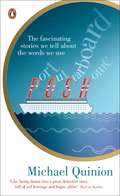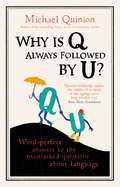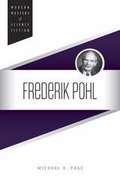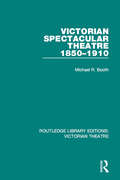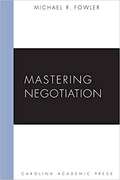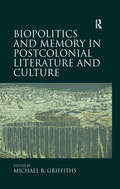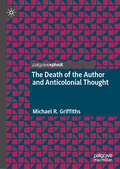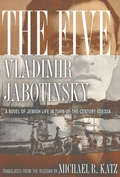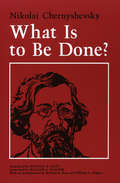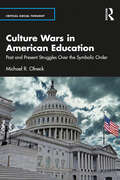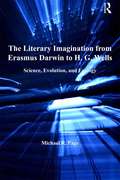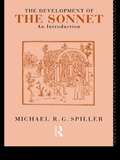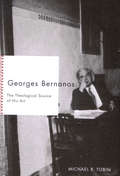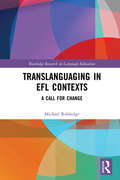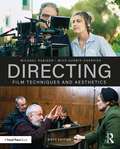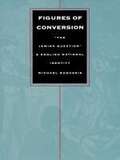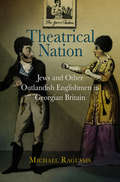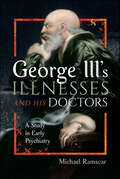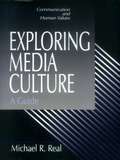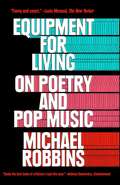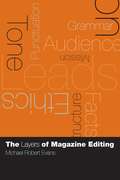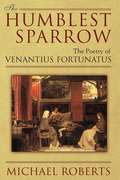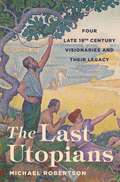- Table View
- List View
Port Out, Starboard Home: The Fascinating Stories We Tell About the words We Use
by Michael QuinionCan it really be true that 'golf' stands for 'Gentlemen Only Ladies Forbidden'? Or that 'rule of thumb' comes from an archaic legal principle that a man may chastise his wife, but only with a rod no thicker than his thumb?These and hundreds of other stories are commonly told and retold whenever people meet. They grow up in part because expressions are often genuinely mysterious. Why, for example, are satisfying meals 'square' rather than any other shape? And how did anyone ever come up with the idea that if you're competent at something you can 'cut the mustard'?Michael Quinion here retells many of the more bizarre tales, and explains their real origins where they're known. This is a fascinating treasure-trove of fiction and fact for anyone interested in language.
Why is Q Always Followed by U?: Word-Perfect Answers to the Most-Asked Questions About Language
by Michael QuinionLong-time word-detective and bestselling author of Port Out, Starboard Home, Michael Quinion brings us the answers to nearly two hundred of the most intriguing questions he's been asked about language over the years. Sent to him by enquiring readers from all around the globe, Michael's answers about the meanings and histories behind the quirky phrases, slang and language that we all use are set to delight, amuse and enlighten even the most hardened word-obsessive.Did you know that 'Blighty' comes from an ancient Arabic word? Or that Liberace cried his way to the bank so many times people think he came up with the phrase? That 'cloud nine' started out as 'cloud seven' in the speakeasies of '30s America? And that the first person to have their thunder stolen was a dismal playwright from Drury Lane? Michael Quinion's Why is Q Always Followed By U? is full of surprising discoveries, entertaining quotations and memorable information. There are plenty of colourful stories out there, but Michael Quinion will help you discover the truth that lies behind the cock-and-bull stories and make sure you're always linguistically on the ball.
Frederik Pohl
by Michael R PageOne of science fiction's undisputed grandmasters, Frederik Pohl built an astonishing career that spanned more than seven decades. Along the way he won millions of readers and seemingly as many awards while producing novels, short stories, and essays that left a profound mark on the genre. In this first-of-its-kind study, Michael R. Page traces Pohl's journey as an author but also uncovers his role as a transformative figure who shaped the genre as a literary agent, book editor, and in Gardner Dozois' words, "quite probably the best SF magazine editor who ever lived."
Victorian Spectacular Theatre 1850-1910 (Routledge Library Editions: Victorian Theatre #3)
by Michael R. BoothOriginally published in 1981. This study concentrates on one aspect of Victorian theatre production in the second half of the nineteenth century – the spectacular, which came to dominate certain kinds of production during that period. A remarkably consistent style, it was used for a variety of dramatic forms, although surrounded by critical controversy. The book considers the theories and practice of spectacle production as well as the cultural and artistic movements that created the favourable conditions in which spectacle could dominate such large areas of theatre for so many years. It also discusses the growth of spectacle and the taste of the public for it, examining the influence of painting, archaeology, history, and the trend towards realism in stage production. An explanation of the working of spectacle in Shakespeare, pantomime and melodrama is followed by detailed reconstructions of the spectacle productions of Irving’s Faust and Beerbohm Tree’s King Henry VIII.
Mastering Negotiation
by Michael R. FowlerThis comprehensive book covers the key stages of the negotiation process: choosing an approach, preparing to negotiate, initiating talks, moving to substantive bargaining and problem-solving, overcoming common difficulties, and closing a deal. It focuses on issues of negotiation strategy, especially those associated with the interest-based or mutual-gains negotiation that professional negotiators often use in complex disputes. Special features include chapters on cross-cultural negotiations, group negotiations, and ethical issues.
Biopolitics and Memory in Postcolonial Literature and Culture
by Michael R. GriffithsFrom the Truth and Reconciliation Commission in South Africa to the United Nations Permanent Memorial to the Victims of Slavery and the Transatlantic Slave Trade, many worthwhile processes of public memory have been enacted on the national and international levels. But how do these extant practices of memory function to precipitate justice and recompense? Are there moments when such techniques, performances, and displays of memory serve to obscure and elide aspects of the history of colonial governmentality? This collection addresses these and other questions in essays that take up the varied legacies, continuities, modes of memorialization, and poetics of remaking that attend colonial governmentality in spaces as varied as the Maghreb and the Solomon Islands. Highlighting the continued injustices arising from a process whose aftermath is far from settled, the contributors examine works by twentieth-century authors representing Asia, Africa, North America, Latin America, Australia, and Europe. Imperial practices throughout the world have fomented a veritable culture of memory. The essays in this volume show how the legacy of colonialism’s attempt to transform the mode of life of colonized peoples has been central to the largely unequal phenomenon of globalization.
The Death of the Author and Anticolonial Thought
by Michael R. GriffithsThe Death of the Author and Anticolonial Thought promises to transform a decades old debate in literary studies about the relation between structure and agency, form and intention by giving a detailed account—previously unstudied—of the way colonized writers have responded to, learned from, and critiqued the death of the author postulate declared by Roland Barthes in 1967. The book is a cultural history of these debates—with a particular focus on two crucial two key case studies, Martinican poet and thinker Édouard Glissant and Palestinian literary and cultural critic Edward Said, this book, then, examines the immediate emergence and intensification of such responses to the postulate of the author’s deathly absence from the text, in order to suggest that metropolitan literary theory drew both critique and engagement from scholars of black, decolonial and Global South background from both before 1967 and Barthes’s declaration and in its wake. This book provides a focused account of the early history of the way global literatures have engaged with, critiqued, and occasionally adopted the lessons and limitations of the poststructuralist critique of that most fetishised and also reviled of figures: the author.
The Five: A Novel of Jewish Life in Turn-of-the-Century Odessa
by Michael R. Katz Michael Stanislawski Vladimir Jabotinsky"The beginning of this tale of bygone days in Odessa dates to the dawn of the twentieth century. At that time we used to refer to the first years of this period as the 'springtime,' meaning a social and political awakening. For my generation, these years also coincided with our own personal springtime, in the sense that we were all in our youthful twenties. And both of these springtimes, as well as the image of our carefree Black Sea capital with acacias growing along its steep banks, are interwoven in my memory with the story of one family in which there were five children: Marusya, Marko, Lika, Serezha, and Torik."--from The Five The Five is an captivating novel of the decadent fin-de-siècle written by Vladimir Jabotinsky (1880-1940), a controversial leader in the Zionist movement whose literary talents, until now, have largely gone unrecognized by Western readers. The author deftly paints a picture of Russia's decay and decline--a world permeated with sexuality, mystery, and intrigue. Michael R. Katz has crafted the first English-language translation of this important novel, which was written in Russian in 1935 and published a year later in Paris under the title Pyatero.The book is Jabotinsky's elegaic paean to the Odessa of his youth, a place that no longer exists. It tells the story of an upper-middle-class Jewish family, the Milgroms, at the turn of the century. It follows five siblings as they change, mature, and come to accept their places in a rapidly evolving world. With flashes of humor, Jabotinsky captures the ferment of the time as reflected in political, social, artistic, and spiritual developments. He depicts with nostalgia the excitement of life in old Odessa and comments poignantly on the failure of the dream of Jewish assimilation within the Russian empire.
What Is to Be Done?
by Michael R. Katz Nikolai Chernyshevsky William G. Wagner"No work in modern literature, with the possible exception of Uncle Tom's Cabin, can compete with What Is to Be Done? in its effect on human lives and its power to make history. For Chernyshevsky's novel, far more than Marx's Capital, supplied the emotional dynamic that eventually went to make the Russian Revolution."--Joseph Frank, The Southern ReviewAlmost from the moment of its publication in 1863, Nikolai Chernyshevsky's novel, What Is to Be Done?, had a profound impact on the course of Russian literature and politics. The idealized image it offered of dedicated and self-sacrificing intellectuals transforming society by means of scientific knowledge served as a model of inspiration for Russia's revolutionary intelligentsia. On the one hand, the novel's condemnation of moderate reform helped to bring about the irrevocable break between radical intellectuals and liberal reformers; on the other, Chernyshevsky's socialist vision polarized conservatives' opposition to institutional reform. Lenin himself called Chernyshevsky "the greatest and most talented representative of socialism before Marx"; and the controversy surrounding What Is to Be Done? exacerbated the conflicts that eventually led to the Russian Revolution.Michael R. Katz's readable and compelling translation is now the definitive unabridged English-language version, brilliantly capturing the extraordinary qualities of the original. William G. Wagner has provided full annotations to Chernyshevsky's allusions and references and to the, sources of his ideas, and has appended a critical bibliography. An introduction by Katz and Wagner places the novel in the context of nineteenth-century Russian social, political, and intellectual history and literature, and explores its importance for several generations of Russian radicals.
Approaches to Teaching Dostoevsky's Crime and Punishment (Approaches to Teaching World Literature #171)
by Michael R. Katz and Alexander BurryRecounting the murder of an elderly woman by a student expelled from university, Crime and Punishment is a psychological and political novel that portrays the strains on Russian society in the middle of the nineteenth century. Its protagonist, Raskolnikov, moves in a world of dire poverty, disillusionment, radicalism, and nihilism interwoven with religious faith and utopianism. In Dostoevsky's innovative style, which he called fantastic realism, the narrator frequently reports from within the protagonist's mind. The depiction of the desperate lives of tradespeople, students, alcoholics, prostitutes, and criminals gives readers insight into the urban society of St. Petersburg at the time.The first part of this book offers instructors guidance on editions and translations, a map of St. Petersburg showing locations mentioned in the novel, a list of characters and an explanation of the Russian naming system, and recommendations for further reading. In the second part, essays analyze key scenes, address many of Dostoevsky's themes, and consider the roles of ethics, gender, money, Orthodox Christianity, and social justice in the narrative. The volume concludes with essays on digital media, film adaptations, and questions of translation.
Culture Wars in American Education: Past and Present Struggles Over the Symbolic Order (Critical Social Thought)
by Michael R. OlneckCulture Wars in American Education: Past and Present Struggles Over the Symbolic Order radically questions norms and values held within US Education and analyses why and how culture wars in American education are intense, consequential, and recurrent.Applying the concept of “symbolic order,” this volume elaborates ways in which symbolic representations are used to draw boundaries, allocate status, and legitimate the exercise of authority and power within American schooling. In particular, the book illustrates the “terms of inclusion” by which full membership in the national community is defined, limited, and contested. It suggests that repetitive patterns in the symbolic order, for example, the persistence of the representation of an individualistic basis of American society and polity, constrain the reach of progressive change. The book examines the World War I era Americanization movement, the World War II era Intercultural Education movement, the late-twentieth-century Multicultural Education movement, continuing right-wing assaults on Ethnic Studies and Critical Race Theory in the first decades of the twenty-first century, and historical and contemporary conflicts over the incorporation of languages other than Standard English into approved instructional approaches.In the context of continuing culture wars in the United States and across the globe, this book will be of interest to graduate students and scholars in critical studies of education, history of education, sociology of education, curriculum theory, Multicultural Education, and comparative education, as well as to educators enmeshed in contemporary tensions and conflicts.
The Literary Imagination from Erasmus Darwin to H.G. Wells: Science, Evolution, and Ecology
by Michael R. PageAt the close of the eighteenth century, Erasmus Darwin declared that he would 'enlist the imagination under the banner of science,' beginning, Michael Page argues, a literary narrative on questions of evolution, ecology, and technological progress that would extend from the Romantic through the Victorian periods. Examining the interchange between emerging scientific ideas-specifically evolution and ecology-new technologies, and literature in nineteenth-century Britain, Page shows how British writers from Darwin to H.G. Wells confronted the burgeoning expansion of scientific knowledge that was radically redefining human understanding and experience of the natural world, of human species, and of the self. The wide range of authors covered in Page's ambitious study permits him to explore an impressive array of topics that include the role of the Romantic era in the molding of scientific and cultural perspectives; the engagement of William Wordsworth and Percy Shelley with questions raised by contemporary science; Mary Shelley's conflicted views on the unfolding prospects of modernity; and how Victorian writers like Charles Kingsley, Samuel Butler, and W.H. Hudson responded to the implications of evolutionary theory. Page concludes with the scientific romances of H.G. Wells, to demonstrate how evolutionary fantasies reached the pinnacle of synthesis between evolutionary science and the imagination at the close of the century.
The Development of the Sonnet: An Introduction
by Michael R. SpillerFirst published in 1992. Routledge is an imprint of Taylor & Francis, an informa company.
Georges Bernanos
by Michael R. TobinMichael Tobin's study is part literary criticism, part biography. Tobin follows Bernanos and his family from France to Spain during the Civil War and then to Brazil and North Africa. He also provides a thematic synthesis of Bernanos' novels and his extensive body of non-fiction, demonstrating that one fundamental theological truth - the Incarnation of God in Jesus Christ - was the the unifying factor of Bernanos's entangled political and social criticism and the engine of his creative imagination.
Translanguaging in EFL Contexts: A Call for Change (Routledge Research in Language Education)
by Michael RabbidgeThe purpose of this book is to promote the value of translanguaging in EFL teaching contexts. To date, translanguaging has been discussed mostly in regards to US and European contexts. This book will examine the teaching beliefs and practices of teachers within a South Korean elementary school context to evaluate the practices of current teachers who use translanguaging strategies when teaching. This examination utilizes sociological theories of pedagogic discourse to discuss the consequences of language exclusion policies on the peninsula. Using these theories, it presents an argument for why EFL contexts like South Korea need to reevaluate their current policies and understandings of language learning and teaching. By embracing translanguaging as an approach, the author argues, they will transform their traditional notions of language learning and teaching in order to view teachers as bilinguals, and learners as emerging bilinguals, rather than use terms of deficiency that have traditionally been in place for such contexts. This book's unique use of sociological theories of pedagogic discourse supports a need to promote the translanguaging ideology of language teaching and learning.
Directing: Film Techniques and Aesthetics
by Michael Rabiger Mick Hurbis-CherrierDirecting: Film Techniques and Aesthetics is a comprehensive exploration into the art and craft of directing for film and television. It’s filled with practical advice, essential technical information, and inspiring case studies for every stage of production. This book covers the methods, technologies, thought processes, and judgments that a director must use throughout the fascinating process of making a film, and concentrates on developing the human aspects of cinema to connect with audiences.The fully revised and updated 6th edition features new sections on using improvisation, the development of characters for long form television series, visual design, the role of the digital imaging technician, film promotion and distribution, alongside expanded information on contemporary color grading tools, stylistic approaches and genre, workflows, blocking scenes for the camera and more. The book emphasizes independent and short form cinema which allows cutting-edge creativity and professionalism on shoestring budgets. Recognizing that you learn best by doing, it includes dozens of practical hands-on projects and activities to help you master technical and conceptual skills. Just as important as surmounting technological hurdles is the conceptual and authorial side of filmmaking. This book provides an unusually clear view of the artistic process, particularly in working with actors and principle crew members. It offers eminently practical tools and exercises to help you develop your artistic identity, find credible and compelling stories, choose and work with your cast and hone your narrative skills. Directing shows you how to surpass mere technical proficiency and become a storyteller with a distinctive voice and style. The accompanying companion website includes film analysis exercises, shooting projects, checklists and assignment forms, analytical questionnaires, updated production forms and logs for all phases of a project with links to additional resources and set safety advice.
Figures of Conversion: “The Jewish Question” and English National Identity
by Michael Ragussis"I knew a Man, who having nothing but a summary Notion of Religion himself, and being wicked and profligate to the last Degree in his Life, made a thorough Reformation in himself, by labouring to convert a Jew."--Daniel Defoe, The Farther Adventures of Robinson Crusoe (1719)When the hero of Defoe's novel listens skeptically to this anecdote related by a French Roman Catholic priest, he little suspects that in less than a century the conversion of the Jews would become nothing short of a national project--not in France but in England. In this book, Michael Ragussis explores the phenomenon of Jewish conversion--the subject of popular enthusiasm, public scandal, national debate, and dubbed "the English madness" by its critics--in Protestant England from the 1790s through the 1870s.Moving beyond the familiar catalog of anti-Semitic stereotypes, Ragussis analyzes the rhetoric of conversion as it was reinvented by the English in sermons, stories for the young, histories of the Jews, memoirs by Jewish converts, and popular novels. Alongside these texts and the countertexts produced by English Jews, he situates such writers as Edgeworth, Scott, Disraeli, Arnold, Trollope, and Eliot within the debate over conversion and related issues of race, gender, and nation-formation. His work reveals how a powerful group of emergent cultural projects--including a revisionist tradition of the novel, the new science of ethnology, and the rewriting of European history--redefined English national identity in response to the ideology of conversion, the history of the Jews, and "the Jewish question."Figures of Conversion offers an entirely new way of regarding Jewish identity in nineteenth-century British culture and will be of importance not only to literary scholars but also to scholars of Judaic and religious studies, history, and cultural studies.
Theatrical Nation
by Michael RagussisPerhaps the most significant development of the Georgian theater was its multiplication of ethnic, colonial, and provincial character types parading across the stage. In Theatrical Nation, Michael Ragussis opens up an archive of neglected plays and performances to examine how this flood of domestic and colonial others showcased England in general and London in particular as the center of an increasingly complex and culturally mixed nation and empire, and in this way illuminated the shifting identity of a newly configured Great Britain.In asking what kinds of ideological work these ethnic figures performed and what forms were invented to accomplish this work, Ragussis concentrates on the most popular of the "outlandish Englishmen," the stage Jew, Scot, and Irishman. Theatrical Nation understands these stage figures in the context of the government's controversial attempts to merge different ethnic and national groups through the 1707 Act of Union with Scotland, the Jewish Naturalization Bill of 1753, and the Act of Union with Ireland of 1800.Exploring the significant theatrical innovations that illuminate the central anxieties shared by playhouse and nation, Ragussis considers how ethnic identity was theatricalized, even as it moved from stage to print. By the early nineteenth century, Anglo-Irish and Scottish novelists attempted to deconstruct the theater's ethnic stereotypes while reimagining the theatricality of interactions between English and ethnic characters. An important shift took place as the novel's cross-ethnic love plot replaced the stage's caricatured male stereotypes with the beautiful ethnic heroine pursued by an English hero.
George III's Illnesses and his Doctors: A Study in Early Psychiatry
by Michael RamscarIn the late eighteenth century mental illness was treated with brutal and inhumane methods by ‘mad-doctors’, and the treatment of George III was no exception. George III’s Illnesses and His Doctors provides an insightful, forensic and sympathetic picture of how and why members of the royal family turned in desperation to an unqualified quack practitioner, James Lucett, in the hope of finding a cure for the king’s ‘insanity’. Much has been written in the past about ‘Mad King George’. This book brings fresh evidence and new understanding to the case of the ‘mad’ king. Lucett’s claims were tested in psychiatry’s first ‘therapeutic trial’ and science was invoked in an attempt to improve understanding of the roots of insanity. The results were mixed but nevertheless George III’s case and the subsequent career of the deeply flawed Lucett were important elements in the revolutionary change in attitudes to the treatment of the insane which came about as the nineteenth century progressed. Based closely on primary source material, George III’s Illnesses and His Doctors is a moving story of human suffering but also of efforts to challenge medical orthodoxy and to improve understanding of mental illness. Some of the issues raised in the early nineteenth century remain to be resolved now.
The Gargantuan Polity
by Michael RandallCritics and scholars have long argued that the Renaissance was the period that gave rise to the modern individual. The Gargantuan Polity examines political, legal, theological, and literary texts in the late Middle Ages, to show how individuals were defined by contracts of mutual obligation, which allowed rulers to hold power due to approval of their subjects. Noting how the relationship between rulers and individuals changed with the rise of absolute monarchy, Michael Randall provides significant insight into Renaissance culture and politics by showing how individuals went from being understood in terms of their objective relations with the community to subjective beings. By studying this evolution, he challenges the argument that subjectivity enabled modern political autonomy to come into existence, and instead argues that subjectivity might have disempowered the outwardly directed and highly political individuals of the late Middle Ages. A profound and detailed study of one of the most drastic periods of change, The Gargantuan Polity will be of interest to scholars of French literature, the Renaissance, and intellectual history.
Exploring Media Culture: A Guide (Communication and Human Values)
by Michael RealThis unique textbook provides a fresh interpretation of media analysis and cultural studies. Each chapter focuses on a particular aspect of American popular culture - including Hollywood cinema, presidential elections and the Super Bowl - to demystify complex concepts such as ritual, postmodernism and political economy. This use of popular culture texts, narratives and interpretations will enable readers to understand more about this important yet esoteric debate. Exploring Media Culture synthesizes a wealth of information and research and presents this in an engaging and accessible format.
Equipment for Living: On Poetry and Pop Music
by Michael RobbinsBrilliant, illuminating criticism from a superstar poet—a refreshing, insightful look at how works of art, specifically poetry and popular music, can serve as essential tools for living.How can art help us make sense—or nonsense—of the world? If wrong life cannot be lived rightly, as Theodor Adorno had it, what weapons and strategies for living wrongly can art provide? With the same intelligence that animates his poetry, Michael Robbins addresses this weighty question while contemplating the idea of how strange it is that we need art at all. Ranging from Prince to Def Leppard, Lucille Clifton to Frederick Seidel, Robbins’s mastery of poetry and popular music shines in Equipment for Living. He has a singular ability to illustrate points with seemingly disparate examples (Friedrich Kittler and Taylor Swift, to W.B. Yeats and Anna Kendrick’s “Cups”). Robbins weaves a discussion on poet Juliana Spahr with the different subsets of Scandinavian black metal, illuminating subjects in ways that few scholars can achieve. Equipment for Living is also a wonderful guide to essential poetry and popular music.
The Layers of Magazine Editing
by Michael Robert EvansUnlike the myriad writing manuals that emphasize grammar, sentence structure, and other skills necessary for entry-level editing jobs, this engaging book adopts a broader view, beginning with the larger topics of audience, mission, and tone, and working its way down, layer by layer, to the smaller questions of grammar and punctuation. Based on Michael Evans's years of experience as an editor and supplemented by invaluable observations from the editors of more than sixty magazines—including The Atlantic, Better Homes and Gardens, Ebony, Esquire, and National Geographic—this book reveals the people-oriented nature of the job.
The Humblest Sparrow: The Poetry of Venantius Fortunatus
by Michael RobertsA long-awaited study of the poetry of Venantius Fortunatus
The Last Utopians: Four Late Nineteenth-Century Visionaries and Their Legacy
by Michael RobertsonThe entertaining story of four utopian writers—Edward Bellamy, William Morris, Edward Carpenter, and Charlotte Perkins Gilman—and their continuing influence todayFor readers reared on the dystopian visions of Nineteen Eighty-Four and The Handmaid's Tale, the idea of a perfect society may sound more sinister than enticing. In this lively literary history of a time before "Orwellian" entered the cultural lexicon, Michael Robertson reintroduces us to a vital strain of utopianism that seized the imaginations of late nineteenth-century American and British writers.The Last Utopians delves into the biographies of four key figures--Edward Bellamy, William Morris, Edward Carpenter, and Charlotte Perkins Gilman—who lived during an extraordinary period of literary and social experimentation. The publication of Bellamy's Looking Backward in 1888 opened the floodgates of an unprecedented wave of utopian writing. Morris, the Arts and Crafts pioneer, was a committed socialist whose News from Nowhere envisions a workers' Arcadia. Carpenter boldly argued that homosexuals constitute a utopian vanguard. Gilman, a women's rights activist and the author of "The Yellow Wallpaper," wrote numerous utopian fictions, including Herland, a visionary tale of an all-female society.These writers, Robertson shows, shared a belief in radical equality, imagining an end to class and gender hierarchies and envisioning new forms of familial and romantic relationships. They held liberal religious beliefs about a universal spirit uniting humanity. They believed in social transformation through nonviolent means and were committed to living a simple life rooted in a restored natural world. And their legacy remains with us today, as Robertson describes in entertaining firsthand accounts of contemporary utopianism, ranging from Occupy Wall Street to a Radical Faerie retreat.
